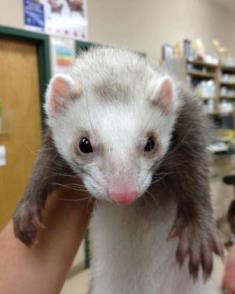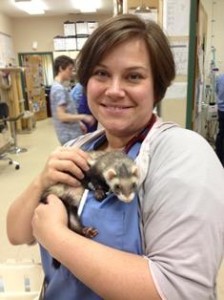Ferrets make wonderful pets. Most ferrets come from a place called Marshall Farms where they are spayed and neutered at a very young age to make better pets. Ferrets naturally have a very distinct odor about them, so they are also descented at a young age. However, even descented ferrets still have an odor about them, so most pet owners will dedicate a room for them with a safe ferret-proof cage.

Ferret patient at Belle Mead Animal Hospital
Ferrets under the age of one year, if not supervised, have a high incidence of swallowing things like little balls that can get stuck in their throat or digestive system and require veterinary care. So please be sure to supervise your ferret while playing, and keep the area clear of small and potentially harmful objects.
Ferrets are very intelligent. You can teach them to do many, many things. Their lifespan in general is about six to nine years of age. There have been some reports of ferrets living beyond nine years, but this is rare.
In general, ferrets under the age of two are sturdy. It’s important to note that they can catch the flu from a person. Therefore, if someone in the household is sick with the flu, make sure they do not handle the ferret, and let others take over the care and feeding responsibilities.
Ferrets need a highly digestible, meat-based, protein diet. Vegetable protein is poorly utilized and therefore should be avoided. We recommend a diet combination of ferret food and high protein kitten food. When they are young, it’s a good time to help them with their palate. Before adding additional foods, do some research and ask your veterinarian about foods you are thinking about to make sure they are digestible and provide the proper nutrition. In general, the safest diet is ferret food and kitten food.
There are two common health considerations that a high percentage of ferrets experience once they reach about four years old, so please make note of the following discussion about insulinomas and adrenal tumors. Proper vaccination should also be scheduled and is mentioned below.

Dr. Kim Somjen, DVM, Belle Mead Animal Hospital, with ferret patient Madeline.
Insulinomas – Seventy percent of ferrets over the age of four at some point or another will probably develop an insulinoma. This is a tumor the size and shape of a sesame seed that develops genetically in their pancreas which secretes insulin. Basically, the condition that develops is the exact opposite of a diabetic. The symptoms are very subtle at first because ferrets sleep long hours anyway. The most common symptoms presenting as an emergency are seizures, unresponsiveness and/or coma.
Ferrets should go to the veterinarian once a year for an exam and to educate their owners. For instance, if an owner goes into their room while the ferret is sleeping, the ferret will typically still pop their little head out to see what’s going on around them. If they are not doing that, they might have an insulinoma.
If you ever notice your ferret pawing at its mouth, this is a symptom of an insulinoma, and you should arrange an appointment with your veterinarian for an examination.
If you notice rear leg weakness, especially on slippery surfaces, or if you notice your ferret is simply stumbling on its rear or weak in its rear, this can be a sign of an insulinoma. Obviously, the most significant signs are the ferret is not moving, in a coma, or having seizures. Sometimes just playing less because they are tired is a symptom. It’s important to be aware of what is normal for your ferret, so you can easily spot abnormal behavior when it presents itself and call your veterinarian to report the changes.
Treatment can be either surgery or simply medication if that is the more affordable course of treatment for you. What is most important is recognizing the signs and contacting your veterinarian before it’s too late. If your pet begins seizuring while you’ve been working or sleeping, either permanent brain damage can occur, or we could lose your little friend completely.
Adrenal tumor – Another common problem ferrets develop is an adrenal tumor. They have two adrenal glands, a right side and a left side gland. The symptoms are hair loss starting over their tail. If you notice some hair loss, please contact your veterinarian for an appointment. Even though ferrets do go through two shedding cycles, it’s important for a veterinarian to determine the difference. If they are losing fur to the point of baldness, they probably have developed a tumor. Other symptoms include rear leg weakness and really bad itching that just won’t stop and gets progressively worse.
An emergency situation occurs when a male ferret has trouble urinating and becomes blocked. This puts them at risk for renal failure. The potassium that they can’t excrete in their urine starts to kill their heart, and that becomes an emergency nightmare. If the pet owner delays calling their veterinarian or emergency clinic for even one night, the ferret might not be saved. Female ferrets might have an enlarged vulva or urinary tract infection. Without a prostrate, they will not experience blockage like a male.
In previous years, the treatment for an adrenal tumor was surgery, and the right side is more technical and dangerous. Now we have implants that can help ferrets affordably for about six months. There is also medication available similar to what is used in vitro for women on a monthly basis, or on a two to three month shot schedule, that is more affordable in most cases.
Some ferrets might have both an insulinoma and adrenal tumor at the same time. You would be surprised how many ferrets have these issues going on without the owner’s knowledge, either because regular veterinary exams have been skipped, or the attending veterinarian may not be specialized in ferret care and fails to detect these problems.
Vaccines – We highly recommend distemper vaccines just like for kittens and puppies, and ferrets do need rabies shots. Discuss a vaccine schedule with your veterinarian.
Joe Martins, DVM, Belle Mead Animal Hospital

Joe Martins, DVM, Belle Mead Animal Hospital


